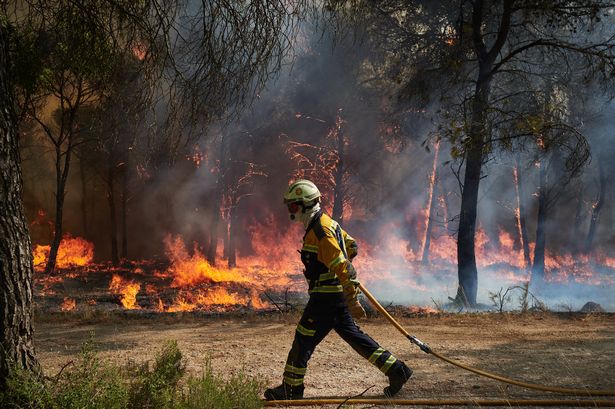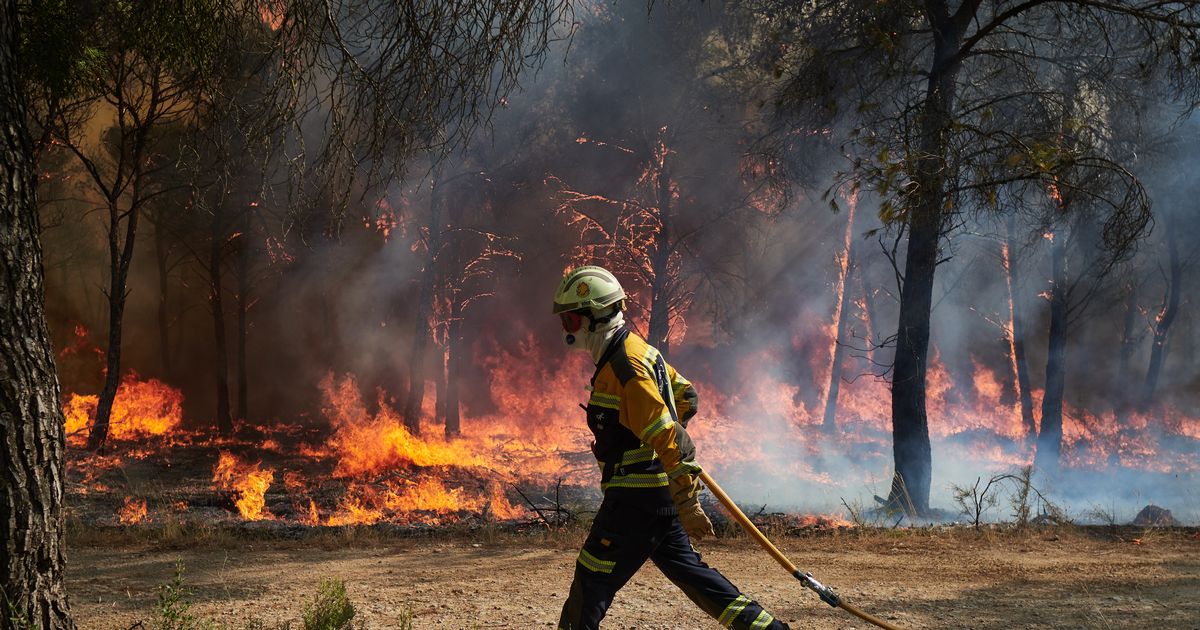Authorities say the situation, also hitting Turkey, could get worse this week
Neil Shaw Assistant Editor
06:39, 11 Aug 2025
 Firefighters continue the extinguishing works to extinguish the fire, on 10 August, 2025 in Carcastillo, Navarra, Spain
Firefighters continue the extinguishing works to extinguish the fire, on 10 August, 2025 in Carcastillo, Navarra, Spain
At least one person has been left dead by wildfires spreading across Greece, with 16,000 acres destroyed. A man has died in the Keratea region near Athens as the National Observatory in Greece said winds which have fanned the flames will continue on Monday.
Italy has closed the national park surrounding Mount Vesuvius as it battles wildfires there – with six planes being used to help the effort. A fire service spokesman said: ” ‘For safety reasons and… to facilitate firefighting and cleanup operations in the affected areas, all activities along the Vesuvius National Park trail network are suspended until further notice.”
Firefighters are also continuing work to extinguish a fire in Carcastillo, Navarra, Spain. The fire started on the night of Saturday, August 9, in a pine forest located next to the road between Carcastillo and Figarol, in Llano de Larrate and continues to affect areas of Aleppo pine. On Sunday night, authorities raised the emergency level for the operation of the Special Emergency Civil Protection Plan for forest fires in the Foral Community of Navarra (INFONA).
1,500 firefighters are tackling fire in Aude, France. The wildfires have been contained in an area of 62 square miles of woodland. Aude prefect Christian Pouget said: ” The fight is continuing, firefighters are still working on (fire) reignition.” He said one person has died and 25 have been injured in the fires.
Firefighters said the oncoming heatwaves could make the fires worse. ” The fire won’t be extinguished for several weeks,” said Colonel Christophe Magny, director of the Aude fire department. Monday is forecast to be the hottest day nationwide in France.
Pouget said 1,000 people had not yet been able to return to their homes after the fire swept through 15 communes in the Corbieres mountain region, destroying or damaging at least 36 homes. Some 1,300 homes were left without electricity after infrastructure was extensively damaged, the Aude prefecture said.
Residents have been warned not to return home without authorisation, as many roads remain blocked and dangerous. Those forced to flee have been housed in emergency shelters across 17 municipalities. Many fled to the community of Tuchan when the fire started on Tuesday, its mayor Beatrice Bertrand told the Associated Press.
“We have received and hosted over 200 people. We gave them food, thanks to local businesses who opened their stores despite it being very late,” Ms Bertrand said. “Civil Protection brought us beds. And also the local villagers offered their homes to welcome them. It was their first night here and many were shocked and scared.”
An investigation is under way to determine what sparked the fire. Authorities said the fire was the largest recorded since France’s national fire database was created in 2006, but the minister for ecological transition, Agnes Pannier-Runacher, went further, calling the blaze the worst since 1949 and linking it to climate change.
The Mediterranean basin has seen multiple large fires this summer. Scientists warn that climate change is exacerbating the frequency and intensity of heat and dryness, making the region more vulnerable to wildfires. Last month, a wildfire that reached the southern port of Marseille, France’s second-largest city, injured around 300 people.
Europe is the world’s fastest-warming continent, with temperatures increasing at twice the speed of the global average since the 1980s, according to the European Union’s Copernicus Climate Change Service.
In Greece, the fast-moving wildfire forced a series of evacuations south east of Athens, approaching residential areas as firefighters battled strong winds. The blaze advanced over scrub-covered hillsides in the Keratea region, spreading through an area with scattered homes 25 miles from the capital.
The Fire Service said one man was found dead during evacuation. As the flames tore through clusters of homes, gas canisters used for cooking exploded, cars went up in flames and residents battled from porches to save their homes. Firefighting planes and helicopters swooped over the flames that sent thick black clouds of smokes toward coastal areas. Authorities deployed 190 firefighters supported by volunteers, and police blocked traffic in the area to allow fire engines through.
Strong winds disrupted ferry services at ports around Athens. A wildfire fuelled by strong winds in north-west Turkey prompted authorities to evacuate a university campus and an elderly care home and to suspend some maritime traffic on Friday, reports said.
The flow of ships through the Dardanelles Strait was temporarily halted due to heavy smoke and reduced visibility in the narrow waterway. The fire broke out at an agricultural field near Saricaeli village, in Canakkale province, before spreading rapidly into a nearby forested area.
With the flames approaching dangerously close to the care home and a campus of Canakkale Onsekiz Mart University, both facilities were evacuated as a precaution, the Cumhuriyet newspaper and other media reported. Footage aired by Haberturk TV showed a fire engine being engulfed in flames, forcing firefighters to flee.
